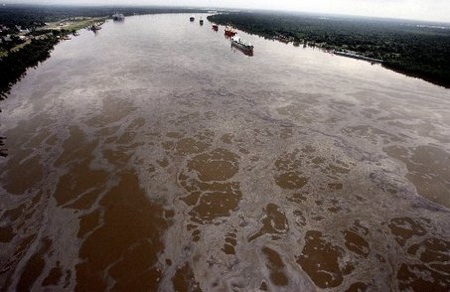
The foreboding of the monstrous Gulf oil spill was accompanied this week by the opportune deeds of Washington lawmakers, policy makers, and activists hard at work to fashion a political response, including the Senate introduction of a comprehensive climate and energy bill. The new proposal was generally applauded for its expansive scope by business groups, labor, and environmental organizations, which also agreed that it needed some work.
But first came the White House, which started the week with a plan to break up the Minerals Management Service, a unit of the Interior Department charged with 1) holding federal bottomland lease auctions that have the effect of promoting the development of offshore drilling, 2) collecting roughly $13 billion annually in federal oil and gas royalties, and 3) regulating offshore oil and natural gas production practices.
Then came a series of investigative hearings on Capitol Hill, during which members of Congress and the public learned from senior executives of the three companies involved in the accident – BP, Transocean, and Haliburton – that technical breakdowns involving tools most Americans never heard of caused an environmental disaster that gets worse by the day. Those included such things as drilling mud applied at the wrong time, dead batteries, and disruption in the functioning of the blowout preventer. It also involved flaws in the sequencing of events to simultaneously manage the extreme pressure of the sea 5,000 feet deep, and oil bursting out of its geological reservoir at the rate of 14,000 pounds per square inch, which is roughly the same power as a big artillery shell fired down the barrel of a cannon.
A Big, Complex, Auspicious Bill
Against this backdrop, and with all of the political and media bunting that they could muster, New England Senators John Kerry and Joe Lieberman introduced the American Power Act. The big bill, 987 pages in its draft form, is intended to change the direction of some of the nation’s toughest systemic problems – economic competitiveness, energy security, job loss, and environmental safety. The proposal encompasses development of the full menu of conventional and alternative energy sources, calls for limits on carbon emissions, and the development of a carbon market to buy and sell allowances.
The bill also calls for contributing to a global climate action fund, starting in 2019, to help developing nations respond to climate change. That provision was viewed as too little and too late by Oxfam America and other climate action organizations. Indeed, many features of the bill – federal incentives to build 12 nuclear plants, support to the coal and electrical utility industry for carbon capture and sequestration projects, plans to withdraw some authority from the EPA to regulate carbon emissions under the Clean Air Act, steps to allow more offshore drilling – attracted similarly skeptical critiques that environmental organizations said they would work to fix.
Oil Ban, Clean Air Carbon Emissions Limits
As the week drew to a close, a flurry of other spill- and climate-related actions stirred Washington. West Coast Democratic Senators Maria Cantwell, Barbara Boxer, Dianne Feinstein, Jeff Merkley, Patty Murray, and Ron Wyden introduced legislation to permanently ban offshore drilling in all federal waters off the coasts of Washington, Oregon and California.
EPA Administrator Lisa Jackson issued new rules under the Clean Air Act that specified which big air polluters – power plants, refineries, large industrial plants – would be required to obtain operating permits based on their emissions of carbon dioxide and other greenhouse gases.
And environmental organizations stepped up their organizing to convince the Senate not to act on a resolution introduced in January by Alaska Republican Senator Linda Murkowski that would prevent the EPA from using the Clean Air Act to regulate carbon emissions.
While all of this occurred, one million more gallons of oil poured into the Gulf, according to federal estimates. The slick, which has already closed fishing grounds and begun to wash up on shorelines, expanded by thousands of square miles. Senator Murkowski, by the way, also blocked a Democratic initiative on Thursday — The Big Oil Bailout Prevention Act — which proposed to raise the liability limits for oil companies from $75 million to $10 billion. The increase was designed to ensure that oil companies pay for the economic and environmental damage caused by big spills.
— Keith Schneider


One thought on “While Oil Gushes Into Gulf, A Flurry of Ideas This Week in Washington”